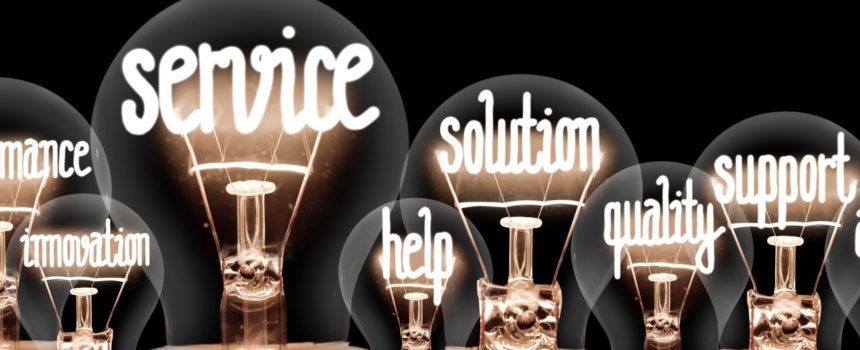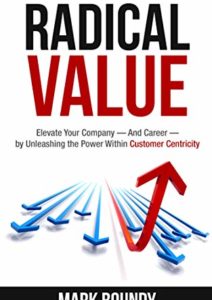Part 2 of a 4 part series.
In my last article, I declared that “customer focus” is too vague to measure and implement, but that “customer value focus” was the essence inside customer focus that you were unknowingly seeking. Then I introduced three domains in which any journey toward value focus should operate. In this article, I’ll talk about the first of those three domains, and what the journey looks like at three different levels.
Every customer value focus journey needs to include some organizational work: alignment between departments. This amounts to de-siloing your organization. I’m all for developing robust expertise in many specialties, but the act of creating silos/departments also creates gaps for important stuff to fall through (it’s science. Anthropology, to be exact).
Working in this domain is coming up with answers to the question:
How well aligned is everyone in your organization to customer-perceived value?
Below, I describe some of the telltale indicators of whether you’ve moved beyond average to Good, Great, or Elite, describing characteristic behaviors at each level.
I’m also grafting in some of the research basis for these three performance levels, using a highly respected research house. Of the 12 organizational behaviors of world-class sales organizations identified by CSO Insights in their 2019 Sales Best Practices Study, (SBPS) three of them belong in this domain.
I’ll plug them in below with the note “CSOi 2019 SBPS”, then their description of the behavior they surveyed for.
Good Organizational Alignment.
Moving from average to good means that an organization started de-siloing. This tends to start as multiple two-department alignments. Think of water droplets on your car roof merging with each other, two at a time — on separate parts of the roof. The drops are getting bigger, but there is still no single organizing theme.
Here is a typical progression for one alignment “convergence”:
- Sales and Marketing become aligned on leads, working toward a single definition of a lead rather than a large disconnect between MQLs and SQLs (marketing and sales qualified leads, respectively)
- Sales and Marketing also begin aligning on content: advertising, sales support, customer education, sales training content and the lie – not necessarily all at once. There is a growing consensus between the two groups on definition, design, and utilization.
- Customer service may be brought into the “team” as well, giving their input. (CSOi 2019 SBPS: Sales, Marketing & Customer Service effectively aligned on customer needs/wants)
Another convergence often takes place between sales operations and sales management. This is common in good organizations but becomes more forward-looking and strategic at a good level. If a sales enablement organization exists in the organization, all 3 have begun to work to a unified set of strategic goals. (CSOi 2019 SBPS: Sales Management, Sales Ops, Sales Enablement effectively aligned to drive results)
There will also be a customer experience (CX) initiative, which tries to capture every role who regularly touches the customer. This CX often starts as a level one CX initiative: everyone working not to be the weak link in a customer’s total experience. Getting all parties aligned is significant progress, but the bar is set low, to “just don’t screw the relationship up”.
Great Organizational Alignment
Where good companies have started interdepartmental alignment, great companies go even further.
Sales & marketing alignment gets deeper and more focused:
- Additional customer-facing organizations merge into the expanding island. At a minimum, sales, marketing & customer service are engaged. (CSOi 2019 SBPS: Sales, Marketing & Customer Service effectively aligned on customer needs/wants = known value gaps. )
- Often, technical sales/sales engineering/application engineering, client success, and possibly technical support are included, at least occasionally.
- Content strategies are now persona-based, and/or optimized for a place in the customer journey. Real account-based marketing might come into use.
- Lead scoring becomes even more sophisticated almost always well-linked to a collaboratively defined ideal customer profile. Lead scoring analytics capture telltale buyer behaviors, not just opens and clicks.
- A voice of the customer function becomes more robust and influential and begins informing content and possibly lead definition
Customer experience management often progresses to level 2: emphasis shifts from “don’t screw anything up” to “figure out how to delight”. Customer-facing roles are almost always empowered to resolve customer issues within their own scope — (CSOi 2019 SBPS: Customers have consistently positive interactions in every channel they use to engage us). In rare cases, if channels partners are used, CX initiatives try to pull them under the CX umbrella.
After some time operating at a “great alignment” level, the organization begins feeling like it values continuous growth culture, and develops a tolerance for continuous change.
Elite Organizational Value Alignment
Where great organizations bring more and more customer-facing roles into alignment with specific personas & are responsive to the customer journey, elite organizations turn several radical performance corners:
- In one radical change, they all align to customer value, not just customer needs/wants. The language of customer outcomes becomes the common denominator in alignment discussions and customer engagement strategies.
- Everyone who touches the customer is proactively engaged…and enlisted in the process of value discovery. Everyone is a “value scout” who brings value gap discoveries back to the hive, for use by sales, marketing, products, production, implementation…every function of the company.
- Lead scoring flows smoothly into opportunity scoring…up to and including the same scorecard through the entire customer journey.
- With deeper insights into the customer world, focus on customer-described and customer-known needs/wants can graduate to predictably-recurring, but customer-unanticipated needs/wants, which often have higher value. Because there are many customer-facing roles engaged in the process, outcomes associated with unanticipated value gaps are much easier to find, and their value easier to articulate.
In Elite organizations, value-based analytics go wider: from sales to every role. Sales, marketing, product training, sales ops/enablement, leadership, and sales coaching are ALL focused in not just on customer features and benefits – but on value.
Customer experience goes to level 3: Beyond “delighting the customer” all customer-facing roles are actively engaged in uncovering…then delivering additional value
I Want More for You. Radical, Elite Value Focus.
Cultural alignment is only one of three domains in your journey to elite value focus. It goes hand-in-hand with the other two: Value-focused Sales Culture and Value-focused Enablement…the topics of my next two articles.
Comment below, like, and/or share. As always, reach out if you have more in-depth questions, or read the next articles…then call me. We can talk about where you are in your journey and where you’d like to go next.
To your success!
What does good/better/best look like with respect to aligning your organization around maximizing customer-perceived value? Find out here.











Comments (1)
On point!
Business should be a complete process and a team play.
Without organizational alignment, it will be difficult to achieve greatness.